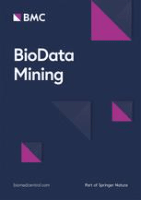
BioData Mining
Scope & Guideline
Unlocking the Secrets of Biological Data
Introduction
Aims and Scopes
- Bioinformatics and Computational Biology:
The journal emphasizes the development and application of computational methods for analyzing biological data, including genomic, transcriptomic, and proteomic datasets. - Machine Learning and Artificial Intelligence:
A core focus on machine learning techniques to enhance predictive modeling, classification, and data interpretation in various biomedical contexts. - Integration of Multi-Omics Data:
Research involving the integration of diverse omics data types (genomics, transcriptomics, proteomics) to provide comprehensive insights into biological processes and disease mechanisms. - Clinical Data Mining and Health Informatics:
Exploration of methods for analyzing health records, clinical data, and patient outcomes to improve healthcare delivery and disease management. - Development of Predictive Models:
Constructing and validating predictive models for disease risk assessment, treatment outcomes, and patient stratification using advanced computational techniques.
Trending and Emerging
- Explainable AI in Healthcare:
There is a rising interest in developing explainable machine learning models to enhance transparency and trust in AI applications within healthcare, facilitating better decision-making. - Use of Generative Models:
Recent studies are increasingly utilizing generative models, such as Generative Adversarial Networks (GANs), for tasks like data imputation and simulation of complex biological phenomena. - Personalized Medicine Approaches:
A trend towards personalized medicine, leveraging machine learning to tailor treatments based on individual patient data and characteristics, is gaining momentum. - Integration of Wearables and Real-Time Data:
Research focusing on the integration of wearable technology and real-time health monitoring data is emerging, highlighting the importance of continuous health assessment. - Ethical AI and Data Privacy:
Emerging discussions around the ethical implications of AI in healthcare, including data privacy and security, are becoming prominent, reflecting societal concerns over biomedical data usage.
Declining or Waning
- Basic Statistical Methods:
There has been a noticeable decrease in the publication of papers focused solely on traditional statistical methods without integration with machine learning or computational techniques, suggesting a shift towards more complex analytical frameworks. - Single-Omics Analysis:
Research solely focused on single-omics studies (e.g., genomics alone) seems to be waning, as the trend moves towards multi-omics approaches that provide a more holistic view of biological systems. - Descriptive Studies without Computational Insight:
Papers that primarily describe biological phenomena without employing computational or machine learning techniques are becoming less common, indicating a preference for data-driven approaches. - Focus on Non-Disease Specific Applications:
Research that does not specifically address disease mechanisms or clinical applications is declining, as researchers increasingly seek to publish work with direct relevance to health outcomes.
Similar Journals
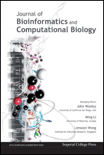
Journal of Bioinformatics and Computational Biology
Navigating the Future of Bioinformatics ResearchThe Journal of Bioinformatics and Computational Biology, published by WORLD SCIENTIFIC PUBL CO PTE LTD, serves as a significant platform for disseminating innovative research in the dynamic fields of bioinformatics and computational biology. With an ISSN of 0219-7200 and an E-ISSN of 1757-6334, this journal facilitates the exchange of ideas and advancements from its inception in 2003 and continues to be pivotal through 2024. Despite its classification in the lower quartiles—Q4 in Biochemistry and Q4 in Molecular Biology, along with Q3 in Computer Science Applications—the journal remains a valuable resource for researchers and students alike, as it emphasizes interdisciplinary approaches essential for tackling complex biological problems through computational methods. Located in Singapore, the journal encourages submissions of high-quality, peer-reviewed articles that offer insights into computational techniques that empower biological research. Although this journal does not offer open access options, its contributions to research are increasingly recognized across various academic platforms. As the field evolves rapidly, this journal continues to attract a growing readership, making it an essential reference point for anyone interested in the intersection of biology and computer science.

Chem-Bio Informatics Journal
Fostering Interdisciplinary Insights in Chemoinformatics and BioinformaticsChem-Bio Informatics Journal is a dedicated platform for the dissemination of innovative research in the intersecting realms of biochemistry and computational science. Published by the CHEM-BIO INFORMATICS SOC in Japan, this journal embraces the rapidly evolving field of chemoinformatics and bioinformatics, fostering scholarly communication among researchers, professionals, and students alike. With its ISSN: 1347-6297 and E-ISSN: 1347-0442, the journal continues to enrich the scientific community by offering insights into novel methodologies and applications that bridge chemistry and biology. Although currently positioned in the fourth quartile in the biochemistry category according to Scopus rankings, contributing to this journal provides an invaluable opportunity for authors to showcase impactful findings that could resonate within the field. The journal is particularly committed to supporting interdisciplinary research that addresses complex biological problems through computational modeling and data analysis. By publishing high-quality and peer-reviewed articles, Chem-Bio Informatics Journal aims to enhance the scientific discourse and is poised to become a pivotal resource for advancing the frontiers of biochemistry and molecular biology.
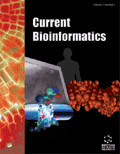
Current Bioinformatics
Innovating Computational Techniques for Biological InsightsCurrent Bioinformatics, an esteemed journal published by Bentham Science Publishers Ltd, serves as a pivotal platform for the dissemination of cutting-edge research in the fields of bioinformatics, biochemistry, computational mathematics, genetics, and molecular biology. With an ISSN of 1574-8936 and an E-ISSN of 2212-392X, this journal has established itself as a vital resource for researchers, professionals, and students keen on exploring interdisciplinary approaches to biological data analysis. Its prominence is reflected in its quartile rankings for 2023, where it stands in Q3 for biochemistry and computational mathematics, alongside Q4 rankings in genetics and molecular biology. Current Bioinformatics, located in the United Arab Emirates and converging from 2007 to 2024, aims to foster innovation in the field by presenting original research articles, reviews, and case studies that drive forward our understanding of complex biological systems through computational techniques. This journal is an integral resource for those wishing to stay at the forefront of bioinformatics research and applications.
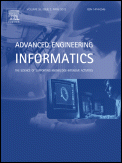
ADVANCED ENGINEERING INFORMATICS
Leading the Charge in Interdisciplinary ResearchADVANCED ENGINEERING INFORMATICS is a prestigious journal published by Elsevier Science Ltd, dedicated to the interdisciplinary fields of Artificial Intelligence and Information Systems. Established in 2002, this journal serves as a vital platform for researchers and practitioners to disseminate groundbreaking insights and innovations that shape the future of engineering and technological integration. With an impressive impact factor and ranked in the Q1 category for both Artificial Intelligence and Information Systems in 2023, it holds a prominent position, with Scopus rankings placing it in the 92nd percentile among 394 journals in Computer Science Information Systems and the 87th percentile among 350 journals in Computer Science Artificial Intelligence. ADVANCED ENGINEERING INFORMATICS embraces an Open Access model, ensuring that cutting-edge research is accessible to a global audience, fostering collaboration and development across academic and professional circles. The journal is committed to advancing knowledge and influencing practice, paving the way for the next generation of technologies that enhance engineering informatics.
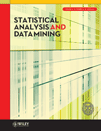
Statistical Analysis and Data Mining
Unlocking Insights Through Statistical InnovationStatistical Analysis and Data Mining is a leading journal published by WILEY, dedicated to exploring the latest advancements in statistical methods and data mining techniques. With an ISSN of 1932-1864 and an E-ISSN of 1932-1872, this journal serves as a significant platform for researchers and professionals in statistical analysis, computer science applications, and information systems. Covering a wide range of topics from innovative analytical methodologies to emerging data mining algorithms, the journal aims to disseminate high-quality research that contributes to the evolving landscape of data science. Ranked in the Q2 category for the fields of Analysis, Computer Science Applications, and Information Systems in 2023, it emphasizes its relevance and impact within academia. While it offers limited Open Access options, the insights shared in this publication are integral for those wishing to stay ahead in fast-paced research and data-driven industries. Since its inception in 2008 and continuing through 2024, Statistical Analysis and Data Mining invites submissions that reflect rigorous empirical research coupled with practical implications, making it a vital resource for the academic community.

CANCER INVESTIGATION
Advancing cancer research, one investigation at a time.CANCER INVESTIGATION is a distinguished peer-reviewed journal published by Taylor & Francis Inc, dedicated to the advancing field of cancer research and oncology. With an ISSN of 0735-7907 and E-ISSN of 1532-4192, this journal has been a pivotal resource for professionals and researchers since its inception in 1983, continually contributing to the evolving landscape of cancer investigation until its convergence in 2024. CANCER INVESTIGATION boasts noteworthy rankings in 2023, including Q3 in Cancer Research and Q2 in Medicine (miscellaneous), highlighting its relevance and impact in these critical areas. The journal's commitment to disseminating innovative research and comprehensive reviews makes it an essential platform for those engaged in cancer studies and related disciplines. While currently not available as an open-access publication, CANCER INVESTIGATION remains an invaluable tool for understanding the complexities of cancer, offering insights that drive scientific advancements and improve patient outcomes.
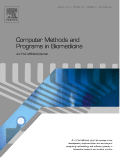
Computer Methods and Programs in Biomedicine
Empowering Biomedical Research through Advanced Computer Applications.Computer Methods and Programs in Biomedicine, published by ELSEVIER IRELAND LTD, is a leading journal at the intersection of computer science and biomedical research. With an impressive impact factor evidenced by its Q1 rankings in multiple categories—Computer Science Applications, Health Informatics, and Software—this journal ranks highly among peer publications, showcasing its significance in advancing interdisciplinary research. Covering a wide array of topics since its inception in 1985, it is particularly crucial for those invested in the innovation of computational methods applied to the biomedical field. The journal has established a strong reputation, with Scopus rankings placing it in the top percentiles across its relevant sectors, including the 14th position out of 138 in Health Informatics. Researchers, practitioners, and students looking to explore current trends, methodologies, and advancements in biomedical applications of computer science will find this journal an invaluable resource.
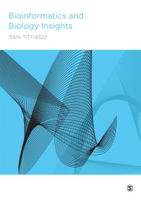
Bioinformatics and Biology Insights
Advancing the intersection of biology and computation.Bioinformatics and Biology Insights is a premier open-access journal dedicated to advancing the frontiers of bioinformatics and biology. Published by SAGE Publications Ltd, this journal is a leading platform for disseminating high-quality research that integrates computational methods with biological insights. Since its inception in 2007, the journal has garnered significant recognition, reflecting its commitment to excellence, as evidenced by its impressive impact factor and a strong presence across multiple quartiles in applied mathematics, biochemistry, and computational sciences. With a rank of Q1 in both Applied Mathematics and Computational Mathematics and various other notable rankings in related fields, it serves as an essential resource for researchers, professionals, and students seeking cutting-edge knowledge and innovations. The journal's open-access model ensures that findings are readily available, fostering collaboration and advancement in this dynamic field. Through its comprehensive scope and rigorous peer-review process, Bioinformatics and Biology Insights continues to play a pivotal role in shaping the future of biological research and computational methodologies.
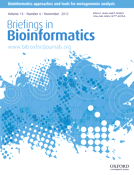
BRIEFINGS IN BIOINFORMATICS
Navigating the Evolving Landscape of BioinformaticsBRIEFINGS IN BIOINFORMATICS is a premier academic journal dedicated to the dynamic field of bioinformatics, published by Oxford University Press. With a prestigious standing reflected in its Q1 quartile rankings in both Information Systems and Molecular Biology, this journal serves as an essential resource for researchers, professionals, and students eager to explore the intersection of biology and computational sciences. The journal not only publishes high-impact research articles but also reviews and critical commentaries that push the boundaries of understanding in bioinformatics. As it converges its objectives towards fostering innovation and knowledge dissemination from 2000 to 2024, BRIEFINGS IN BIOINFORMATICS offers rich insights that remain pivotal to advancements in genomic studies, data integration, and computational tools. Its ranking in the top percentiles of Scopus—30th among 394 in Computer Science and 44th among 410 in Molecular Biology—underscores the journal's influential presence in the academic community. Engaging with the latest research and trends, this journal is integral for anyone invested in the future of life sciences and data analytics.

Quantitative Biology
Advancing Biological Insights Through Quantitative MethodsQuantitative Biology is a prestigious journal published by WILEY, focusing on the interdisciplinary study of quantitative approaches in the biological sciences. With an ISSN of 2095-4689 and an E-ISSN of 2095-4697, this journal has established itself as a critical platform for researchers exploring complex biological systems through mathematical and computational methodologies. Operating out of China, Quantitative Biology significantly contributes to its field, holding a Q2 ranking in various categories, including Applied Mathematics and Biochemistry, Genetics and Molecular Biology, according to the latest Scopus rankings. These rankings reflect the journal's commitment to publishing high-quality research that employs advanced modeling and simulation techniques. The journal's impact is evident with its position in the 84th percentile for Applied Mathematics, indicating its relevance and growth in a competitive academic landscape. Although it does not currently operate under an Open Access model, the journal is pivotal for professionals and students alike, aiming to bridge the gap between mathematical theories and biological applications. Researchers are encouraged to submit their innovative findings and engage with the vibrant community dedicated to advancing the quantitative understanding of biological phenomena.